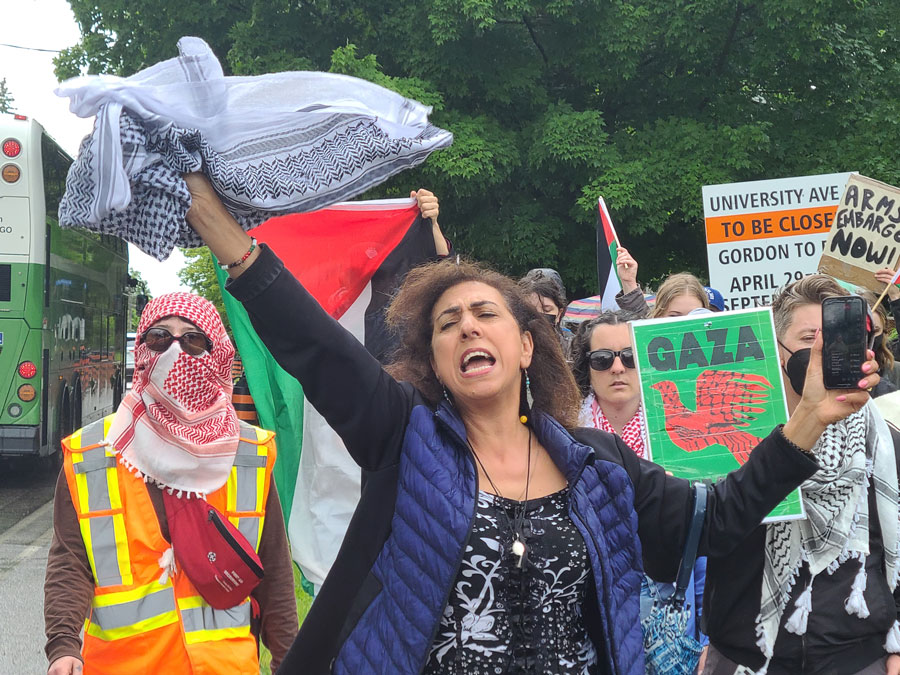GUELPH – Holding umbrellas and homemade signs, about 75 people protested in the rain in front of Guelph MP Lloyd Longfield’s office on June 7.
Activist Horeen Hassan addressed the group, describing what she calls the ongoing “genocide in Gaza” and calling for Canada to stop sending arms to Israel. She spoke of “horrific videos, stories and images” coming from Palestine.
The following day, at least 274 Palestinians, including children, were killed and 698 injured in an Israeli raid at Nuseirat refugee camp in central Gaza, according to Gaza’s Health Ministry. Four Israeli hostages were rescued during the raid, and three more were killed, according to Hamas.
Gaza’s Health Ministry reports Israel’s offensive has killed over 37,150 Palestinians and wounded atleast 84,800 since Oct. 7, when Hamas killed 1,200 Israelis and took about 250 hostage, according to Israeli officials.
“There is no time to delay,” Hassan said. “Our MPs need to hear that we won’t stand for complicity in the atrocities the Israeli state is committing.”
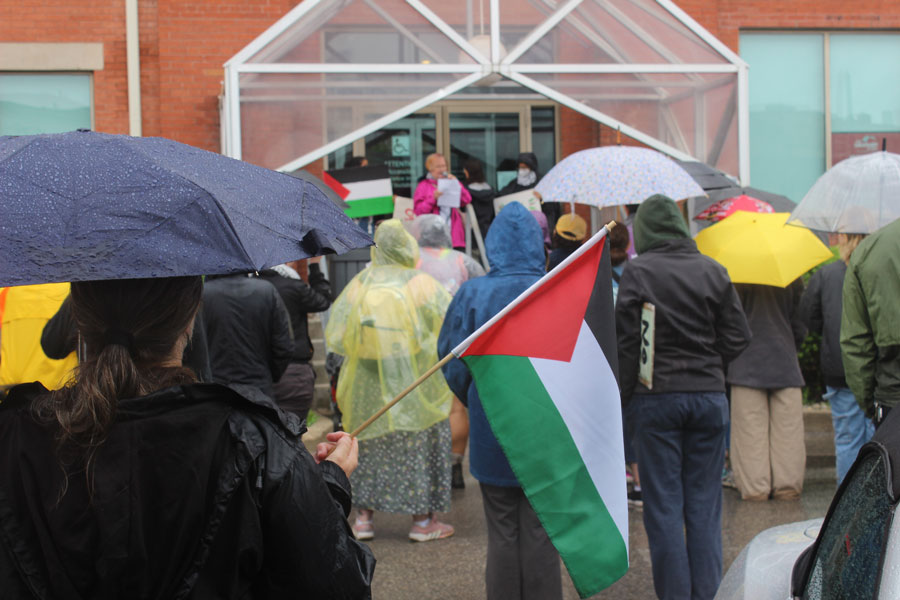
About 75 protestors gathered in the rain outside Guelph MP Lloyd Longfield’s office on June 7, calling for an arms embargo.
Hassan and other activists say Longfield has been ignoring their emails and calls.
Longfield told the Advertiser he is unable to provide comment on the protest because his schedule is full with House of Commons sessions and committee meetings this week.
Arms embargo
“The Canadian government continues to allow military equipment to flow to Israel, despite Parliament voting for an arms embargo,” Hassan said.
The non-binding motion calls for future authorization of arms exports from Canada to Israel to be halted, but does not suspend already-authorized permits, including the $28.5 million of permits approved since Oct. 7.
Last year was a record breaking year for Canadian arms exports to Israel, Hassan noted, with Canada exporting over $30 million in military goods and technology – 43 per cent more than in 2022.
Guelph NDP federal candidate Janice Folk-Dawson is proud of the original NDP motion, but said it was “shameful” that each of its demands were altered.
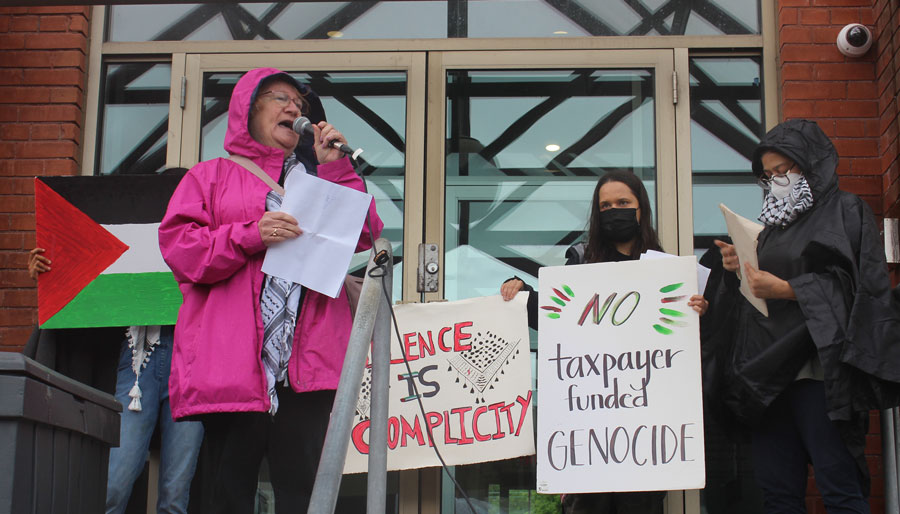
NDP candidate Janice Folk-Dawson, left, and community organizer Horeen Hassan, centre, both gave speeches outside Guelph MP Lloyd Longfield’s office on June 7.
“Civil disobedience is important when other methods have failed,” Folk-Dawson told the protestors, citing examples of it leading to significant “wins,” including the South African Apartheid, the Vietnam War, and feminist and anti-colonialist movements.
The protesters brought a list of demands to Longfield, including an immediate and permanent ceasefire, an end to the siege, occupation, and genocide in Gaza, and a two-way weapons embargo between Canada and Israel.
Prison, displacement
They also called for freedom for all Palestinians held in Israeli prisons and the right of return for Palestinians living in exile.
Protestor Eman Rishmawi is a Palestinian woman who was forced to leave her home in Beit Sahour.
Rishmawi said her father, Atallah Rishmawi, spent about 12 years held in Israeli prisons, though he was never charged and never went to court. He was imprisoned, she said, solely because he organized in support of Palestine, and so she grew up without a father.
“He never believed in violence,” Rishmawi said, he just “tried to spread our ‘free Palestine’ message.” He was released from prison after Beit Sahour’s citizens elected him mayor, she said.
Rishmawi was practicing international law in Palestine about 20 years ago when she took a month off for her brother’s wedding in the U.S.
While she was away, Israel increased movement restrictions in Beit Sahour, and Rishmawi and her family were not able to return, leaving little choice but to move to Canada.
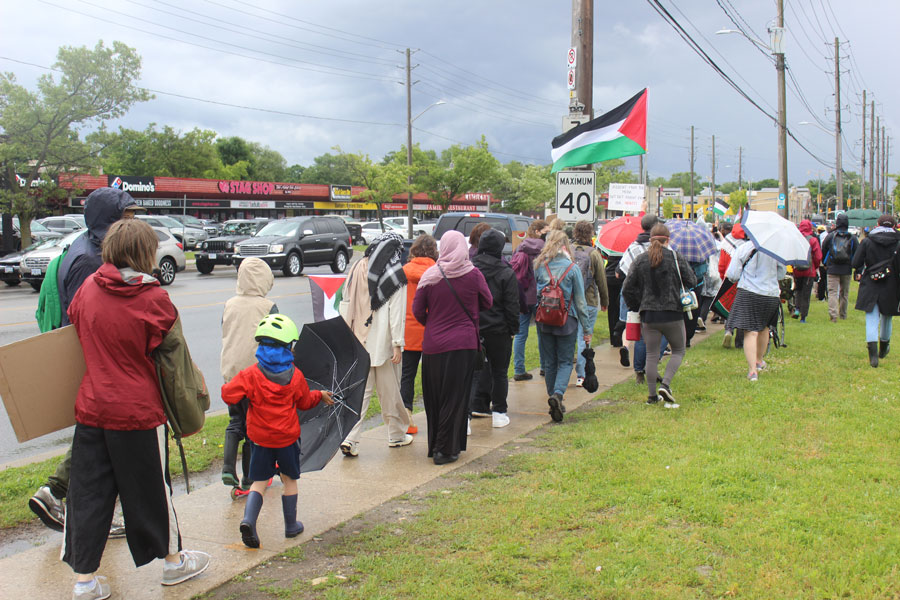
Protestors marched from Guelph MP Lloyd Longfield’s office to a student encampment for Palestine at the University of Guelph.
Now, Rishmawi said she asks herself daily “What am I doing here?” wishing she could go home.
When they left Palestine, Rishmawi’s children were two and four, and her eldest remembers bombs falling.
Her youngest, Jessica Harb, now 22 years old, is active in organizing in support of Palestine. “I’m proud of her,” Rishmawi said.
As children they wanted to stay in Canada, but since Oct. 7, Rishmawi said “the kids understand … we are supposed to be there, in Palestine.”
Unable to go home, Rishmawi joined protesters in a march from Longfield’s office to the University of Guelph, where students camp out, protesting the school’s investments in arms, defence and military contractors.
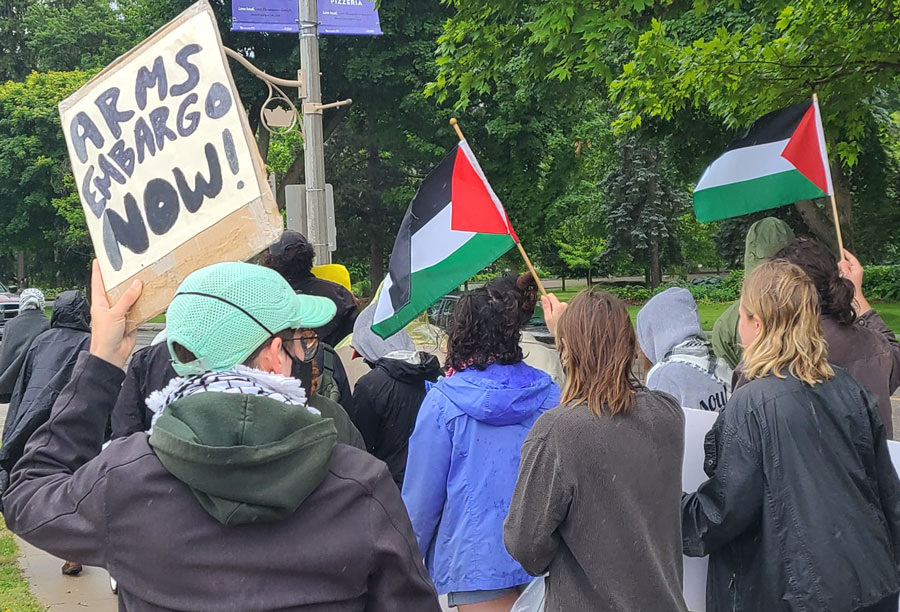
Activists want to see a total arms embargo between Canada and Israel.
University encampment
Rishmawi said it means a lot to her that students stand with Palestine and call for divestment.
During the march, protestors’ rallying calls were drowned out dozens of times by car horns honking in support, and people passing by on bikes joined in with chants. A couple people screamed profanities at the protestors as they passed.
At the encampment, students, alumni, a professor, and a member of Independent Jewish Voices took turns speaking, calling for the university to divest.
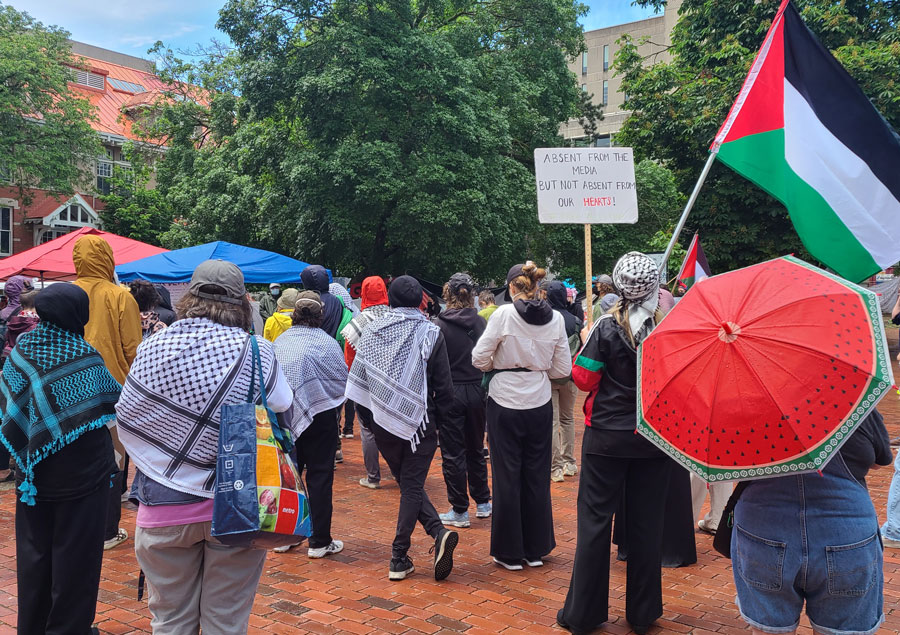
Protestors gathered outside the pro-Palestine encampment at the University of Guelph known as the “People’s Plaza.”
“I’ve been here 11 years now,” said tenured professor Orion Neustifter. “I know how things work here, so I’m … terrified to be seen here, outside my employers’ offices, telling them we all know that they know they profit from war and genocide.”
Neustifter called on their fellow tenured faculty to “be brave.
“Come show the younger generation that we are here and we will put ourselves at risk to protect them … come teach, come sing, come sit and knit, come out and do what you know is right.”
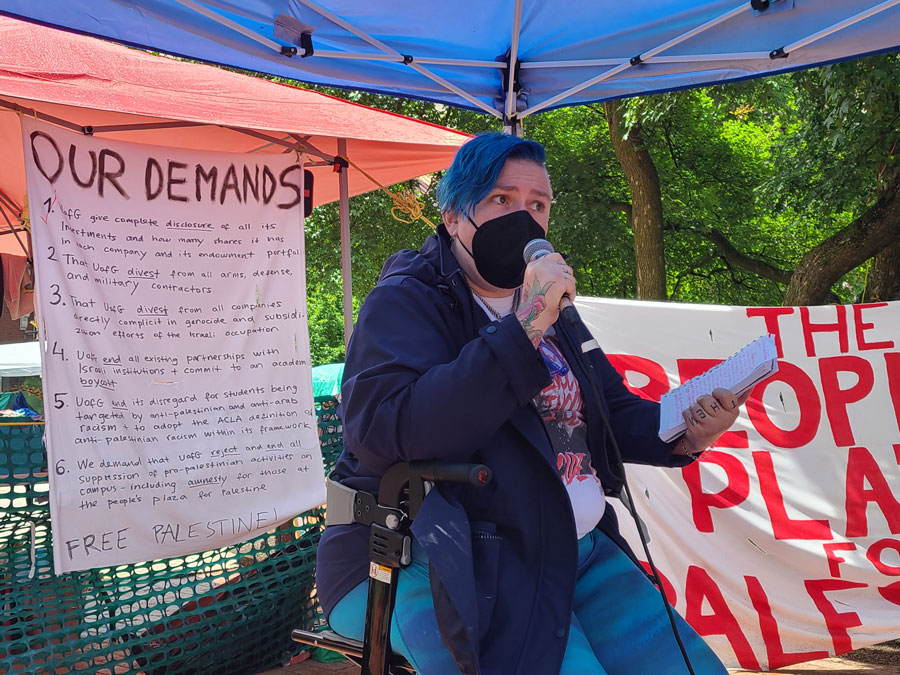
Orion Neustifter is a tenured professor at the University of Guelph who spoke in support of student protestors.
The encampment, called the “People’s Plaza” includes dozens of tents within a temporarily fenced area between the University Centre and library. The students host daily community events including workshops, interfaith services, reading groups and film screenings.
They’re set to stay until the school agrees to six terms, including a complete disclosure of investments and divesting from all arms, defense and military contractors and “companies directly complicit” in what they call “genocide.”
According to UoG for Palestine, the group behind the encampment, the school disclosed holding over $50 million in 82 companies complicit in operations in Palestine, and more than $5 million in “at least 21 large arms, defense, and military contractors.”
These disclosures were made in response to two Freedom of Information requests submitted by activists.
Through negotiations with UoG for Palestine representatives, university officials agreed to publish annual reports of the school’s endowment portfolio, including dollar amounts, moving forward.
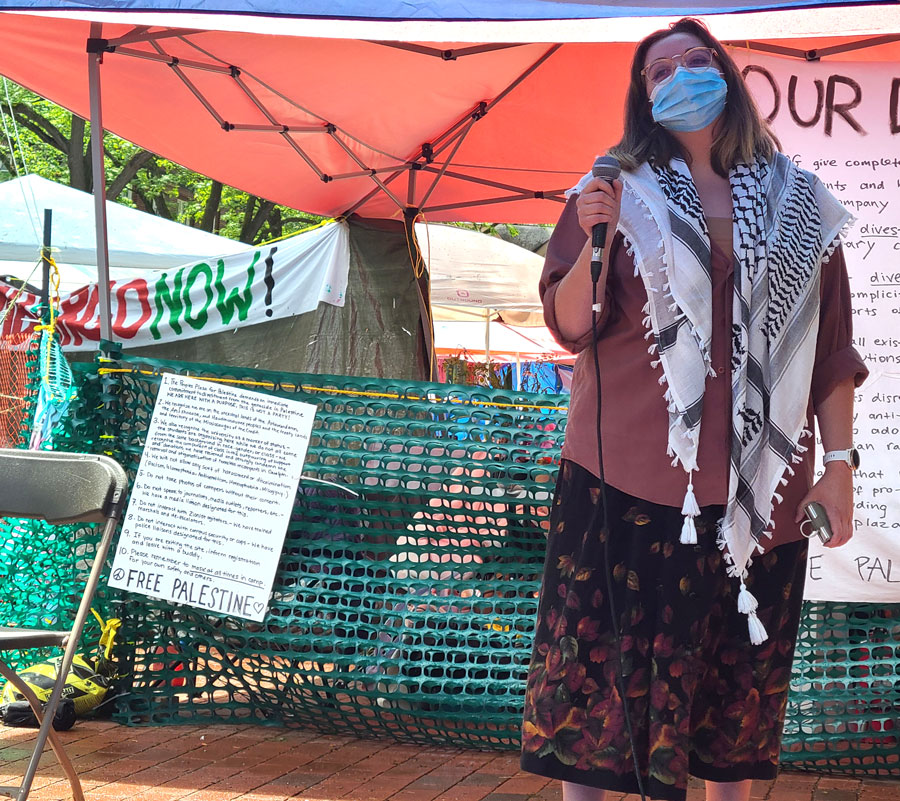
PHD student Kimber Munford is one of the students calling for the university to divest from arms, defence, and military contractors.
Negotiations
U of G administrators met with encampment representatives on June 5 and 6, and president Dr. Charlotte Yates released the university’s most recent statement about the encampment on June 7.
In exchange for the encampment disbanding, Yates stated the university offered to provide an annual investment disclosure; establish scholarships for students displaced by the conflict, including Palestinians; review the university’s human rights policy; and have “additional meetings with the U of G community to better understand their lived experiences and inform the university’s approach to anti-Palestinian racism and anti-Semitism training and education.
“However, encampment representatives have told us they will not disband for anything less than immediate divestment from their specified list of companies, effectively bringing discussions to a close.”
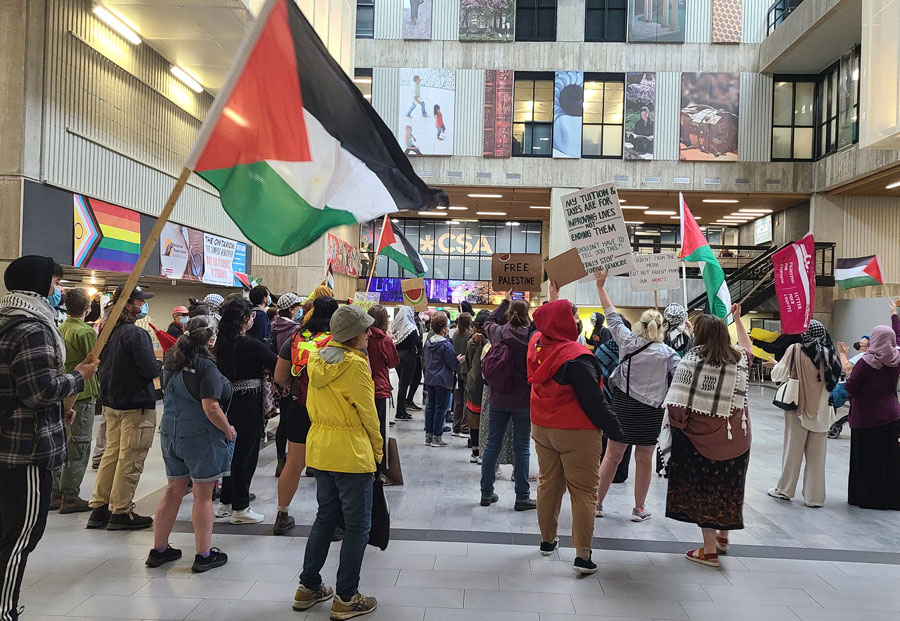
Activists go inside the University Centre to give daily updates about what happened in Palestine in the last 24 hours.
Encampment representatives insisted on immediate divestment since before erecting the encampment on May 21, and administration, Yates states, has “been clear since the beginning that request concerning divestment must be subject to a board of governors process for endowment portfolio management in accordance with the university’s special action policy,” a process she states began in March.
The board is committed to following the policy, she states, and lists a number of factors it will consider, including the complexity of the investments and how divesting would impact the total return.




